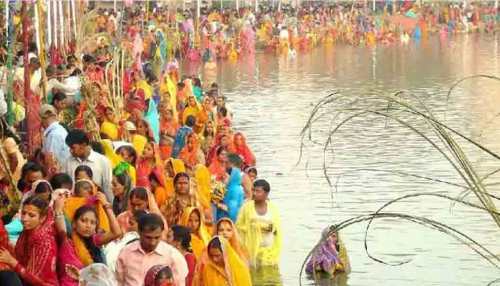- News>
- Culture
Chhath Puja 2020: Nahay Khay puja timings and significance of auspicious day

The four-day long Chhath Puja begins on Wednesday, on November 18.
Highlights
- Chhath Puja festivities begin with ritual called Nahay Khay.
- Nahay Khay is observed on the Chaturthi Tithi of Kartik, Shukla Paksha.
- On this day, devotees consume a satvik meal and thereafter observe a full-day fast.
Chhath Puja 2020: The five-day Diwali festival came to an end with the Bhai Dooj festival on November 16. And now, preparations for the world-famous Chhath Puja has begun.
The four-day long Chhath Puja begins on Wednesday, on November 18. The festival is majorly celebrated in the states of Bihar, Jharkhand, Odisha, Uttar Pradesh and in parts of Nepal. To thank the Sun Lord for sustaining life on Earth, women observe fast, offer their prayers and conclude the puja by worshipping Chhati Maiyya.
Chhath Puja is believed to be the only Vedic festival dedicated to Surya (the Sun God). This festival, which starts on the Chaturthi of Shukla Paksha, is celebrated till Saptami Tithi. It starts with ‘Nahay Khay’ and ends with ‘Usha Arghya’, which is the last day of Chhath on 20 November. On this day, devotees or those who are performing the rituals, eat Satvik food.
Since the main puja revolves around the Sun God, the sunrise and sunset timings are crucial. We bring to you the important dates and importance of Nahay Khay day in Chhath Puja.
What is Nahay Khay?
The Chhath puja vrat festivities begin with Nahay Khay. On this day, those keeping a fast rise early take a bath and wear new-clean clothes while those staying close to a river, take a dip in the holy waters to begin their vrat.
After taking a bath, devotees do Sankalpa (take a pledge) that they would observe the vrat with devotion and sincerity. Then they take the blessings of the Gods and Chhati Maiya for a successful vrat. Subsequently, they eat the first and the only meal of the day.
The meal mainly consists of curry prepared with bottle guard (Lauki) and gram pulse (chane ki daal). The food prepared for Nahay Khay is satvik and are free of onion and garlic. Those performing the puja, observing fast, generally sleep on the floor and not on a bed or mattress.
The day is called Nahay Khay as on this day, devotees wake up early, take a bath and consume food after that. The person breaks the fast only the next day after offering his/her prayers to the rising Sun
Chhath Puja 2020: Important Dates
Day 1: Kaddu Bhaat or Nahay Khay — Nov 18
The festival is spread across four days, beginning with Shakul Chaturthi and concluding with Saptami. The main day of the festival include Chhath Pujan and Sandhya Arghya on Shashti which is on November 18, 2020.
Sunrise timing: 6:46 am
Sunset timing: 5:26 pm
Day 2: Kharna — Nov 19
The second day, ie, on the Panchami Tithi, devotees celebrate Kharna, by observing Nirjala vrat (fasting without drinking even a drop of water) from sunrise to sunset. They break their fast only after offering their prayers to the Sun God during sunset. On this day, women prepare sweets as prasad. The prasad offerings include sweets, Kheer, Thekua and fruits (mainly sugarcane, sweet lime and banana) offered in small bamboo soop winnows. The food is strictly vegetarian and is cooked without salt, onions or garlic. Emphasis is put on maintaining the purity of the food.
This year Lohanda and Kharna falls on November 19, 2020.
Sunrise time: 6:47 am
Sunset time: 5:26 pm
Day 3: Chhath puja — Nov 20
The main day of Chhath Puja is on the Shashthi of Shukla Paksha of Kartik month. Chhath Puja is done on this day only. The third day of the festival is the main puja day, and it is called Chhath Puja. It is observed on Shashti Tithi of Shukla Paksha of Kartik month. On this day, women offer Sandhya Arghya. Women observe a day-long fast and break it only on the following day after sunrise.
Sunrise time: 6:48 am
Sunset time: 5:26 pm
Day 4: Usha Arghya — Nov 20
The last day of Chhath Puja is observed on the seventh day of Shukla Paksha of Kartik month. Women, who observe the Chhat Puja Vrat, break their fast (do the Parana) on this day. They offer their prayers and water to the Sun God. This year, Usha Arghya and Parana of Chhath Puja will take place on November 21.
Sunrise time: 6:49 am
Sunset time: 5:25 PM
Interestingly, sunrise and sunset timings are of great significance because they represent the cycle of birth and death.
Here's wishing one and all a very Happy Chhath Puja!
